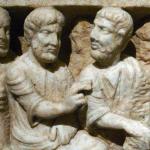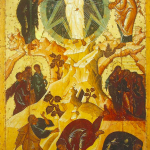The relationship between the notion of a person and the notion of an individual is interesting and complex. The long history of Christian theology and its discovery of the theological person is important, but need not concern us here. The notion as it developed from Christian theology (based in part, to be sure, on pre-Christian anticipations of Christian personalism) has been accepted in society and is now employed by Christian and non-Christian alike. What concerns us are the meanings behind the terms, and what they mean to us as Christians.
Despite what some might think, a person is not an identical concept to that of the individual. A person is a relational entity and can only be known when it is seen in relation to others; the individual is an entity trying to exist on its own, separated from everything outside of itself. We experience being as persons; we are given our personal vocation by God, and this defines who we are as a person. We have a common human nature with other human persons. This allows us to be in communion with one another (analogous to how the persons of the Trinity participate in the same divinity and are in communion with one another). How we relate to one to another demonstrates who we are as a person (once again analogous to what we see in the Holy Trinity). Even though our personal existence is given to us by God, he has given us a role in its development – he has given us a creative freedom which we use to present who we are to others.
If there had been no sin, there would have been distinction without division in humanity, and we would have had an open relationship with each other and with God. It would have led to the experience of the fullness of the divine life. That is, even if there had been no fall, there would have been an incarnation of God, because God became one of us, not just to save us, but to open us to the fullness of God’s internal life. It was what God desired for creation, as Bulgakov points out, “One can even say that God created the world in order to become incarnate in it, that He created it for the sake of His Incarnation. The Incarnation is not only the means to the redemption; it is also the supreme crowning of the world, even in comparison with its creation. In the Incarnation, God showed His love for creation,” Sergius Bulgakov, The Lamb of God. Trans. Boris Jakim (Grand Rapids, MI: William B. Eerdmans Publishing Company, 2008), 169.
But this is not what happened. The universe we live in is a fallen universe. Our mode of existence is fallen. We experience reality not as perfect, relational persons, but as individuals separated from, and divided against, one another. Even though there is but one human nature, we wouldn’t know it, because the individual is experienced as being greater than our nature, causing self-love to grow. The distinctions between persons have become dividing-lines in human nature, whereupon humanity is turning against itself. “The self-love and cleverness of men, alienating them from each other and perverting the law, have cut our single human nature into many fragments. They have so extended the insensibility which they introduced into our nature and which now dominates it, that our nature, divided in will and purpose, fights against itself,” St Maximos the Confessor, “First Century of Various Texts,” in Philokalia Volume Two. Trans. G.E.H. Palmer, Philip Sherrard and Kallistos Ware (London: Faber and Faber, 1990), #46. Sin is the source for division in the world; whenever we see and experience the world divided against itself, we see the effects of sin. And this, sadly, has its greatest outlet in our own lives as we turn ourselves into individuals set apart from everyone else. “The root sin or the root of all sin is the assertion of oneself as oneself, without relation to that which is other, i.e., to God and to all creation. It is self-immersion without self-transcendence. All particular sins are only variants or manifestations of the stubborn self-immersion of self-hood. In other words, sin is the power of the protection of oneself as oneself that makes the person a ‘self-idol.’ It is the power that ‘explains’ I through I, not through God, and grounds I in I, not in God. Sin is the fundamental striving of I by which I becomes firm in its isolation and makes of itself the unique point of reality,” Pavel Florensky, The Pillar and Ground of the Truth. Trans. Boris Jakim (Princeton: Princeton University Press, 1997), 132.
Some might think that the individual is prior to the person, but this cannot be. We are contingent in our existence; we do not make ourselves to be. In our very existence, we are who we are only in relation to some external source for our existence; that is, we relate to the world through our parents (and God). This means, in our existence, we exist as relational persons first. Indeed, one can say even our awareness of ourselves as selves comes from our relations with others. Hans Urs von Balthasar has a beautiful description for where he thinks this process begins: “Now man exists only in dialogue with his neighbor. The infant is brought to consciousness of himself only by love, by the smile of his mother. In that encounter, the horizon of unlimited being opens itself for him, revealing four things to him: (1) that he is one in love with the mother, even in being other than his mother, therefore all being is one; (2) that that love is good, therefore all Being is good; (3) that that love is true, therefore all Being is true; and (4) that that love evokes joy, therefore all Being is beautiful,” Hans Urs von Balthasar, “Retrospective (1988),” pages 111 – 119 in My Work In Retrospective. Trans. Kelly Hamilton (San Francisco: Ignatius Press, 1993), 114.
It is only after we come to realize distinctions in the universe that we reify them. Because of our fallen mode of existence, that process begins almost at the same time we realize our relationships with others. The ego develops and quickly puts up a barrier or wall around itself to defend itself from all which would seek to eliminate or weaken it. And since this happens at such an early stage of life, it is easy to how the individualistic ego takes control of our conscious awareness, so that we interpret the world by its guidance. What was prior to it has been regulated to the subconscious; that prior experience still influences us, but those influences are lost to our conscious awareness unless we struggle to reform it, forcing it to allow us access to our subconscious life. Even the voice of God, our conscience, can either be manifested in our life consciously or subconsciously, depending upon how much we have worked to integrate our personal existence into our conscious awareness (the process of which I partially described in “On the Conscience and Our Response to It“),
Certainly we must realize that individualistic experience is not the way God wanted us to encounter life. But because of the fall, the effects of sin manifested themselves in us; concupiscence now gets in the way of our experience of reality and directs us to develop an awareness of ourselves as individuals at the earliest stages of life; it is by concupiscence that our reification of nature, and especially of our turning the person into an individual, begins, and it is through concupiscence that our ego is guided to build up its wall to defend itself from all outside attack. The ego exists in us like a parasite. And we must realize its influence transcends our conscious existence; it has seeded itself in our subconscious in such a way that a cursory glance through the subconscious will make it seem as if the subconscious confirms the priority of the ego, of the individualistic self. Through the years, it works very hard to cover up our original, pure relational self, because a real awareness of that person works to destroy the illusion of the ego. The individual can only exist as a fallen person; and it is for this reason that, for the person to live and thrive, for the pure image and likeness of God within that individual to be cleared from the mire of sin, the individuated self must be given up and die. “Then Jesus told his disciples, ‘If any man would come after me, let him deny himself and take up his cross and follow me. For whoever would save his life will lose it, and whoever loses his life for my sake will find it,‘” (Mt 16:24-25). Only when we deny ourselves, deny our individualized existence, put it to the cross, and let it die, will we find true personal life. But the more we struggle to preserve it, that much of our person will be destroyed, until, in the end, we can lose our personal life and find ourselves in the perpetual habit of the ego, which is the experience of hell. Of course, whether or not anyone will let the ego takes such control that their personal life is totally destroyed is not known. And if, on any step on the path to hell, one turns against the ego and opens oneself to God, God can resurrect what the ego previously destroyed; all does not have to be lost.
From what has been said here, we can understand the problems inherent within individualism. It trumpets the individual, placing this self upon an idolatrous pedestal. And yet it tries to find a way to explain why society exists at all; that is, it tries to explain why political structures are necessary in a world of individuals. “The old naïve social atomism, associated with the rationalistic individualism of the eighteenth century, considers all harmony, all unity, of social life to be possible only as a result of conscious, deliberate agreement among individuals. In their common interest, individuals agree among one another that they will observe a certain common order of life, that, as far as possible, they will not hamper and harm one another, that they will subordinate themselves to certain general rules, or to a commonly elected authority, and so on. The unity of society is the result of voluntary, conscious agreement of the wills and actions of individuals. This is the essence of the once-celebrated theory of the ‘social contact,‘” S.L. Frank, The Spiritual Foundations of Society. Trans. Boris Jakim (Athens, Ohio: Ohio University Press, 1987), 36. Of course, not everything is erroneous in a political system based upon individualism. For behind the individual is a real person. Individualism turned into social theory tries to suggest reasons why individuals need to cooperate with one another, and it borrows answers from our personalistic existence; even though it regulates the individual as the highest good, it contradicts itself, by admitting, in the process of politics, that the individual is not self-sufficient and is in need of others. And this simple fact is but one of many fractures one can discover behind any political theory based upon individualism to open it up into something better, something more benevolent. Nonetheless, individualism continues to influence and shape society because it helps serves the individualistic ego in its attempts to defend itself; it builds itself upon the desires of human concupiscence, and finds ways to satisfy them. It helps make us, like Satan, feel like gods in the world. “In the creaturely, sinful world, love for one’s own, that is, in essence, love for oneself, acquires the character of self-love and prejudice, in virtue of which this ‘one’s own’ is prized not at its essential and true worth but precisely as one’s own; this is the egotistical admiration of one’s own image, ‘narcissism.’ Herein lies the principle of the fall of Satan, who fell in love with himself, who came to love his own with an egotistical, self-asserting love,” Bulgakov, The Lamb of God, 105.
















